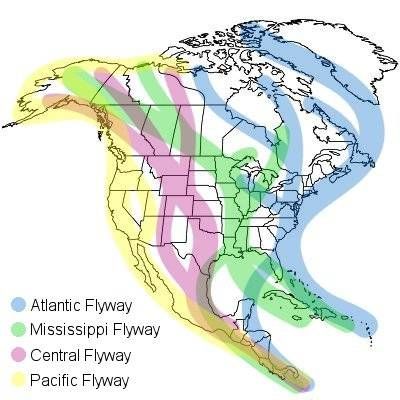Small flocks and avian influenza
Learn more about flock management, and protecting and improving flock health
Highly Pathogenic Avian Influenza (HPAI) can cause disease and death in many species of birds, including both wild migratory birds, as well as domestic poultry, whether they are kept in small flocks of larger commercial settings.

Highly Pathogenic Avian Influenza (HPAI) has been detected in wild migratory birds in many European and Asian countries, and more recently, also in the Atlantic provinces of Canada, and several states in the U.S.
These birds often co-mingle in the far north during the summer, then migrate "home" in the fall, allowing for further spread of HPAI.
These wild birds then are a potential source of the virus for transmission to both local small poultry flocks, as well as commercial flocks. So far this spring (March 2022) HPAI has been detected in birds on each of the North American flyways, which means that migrating wild birds may be carrying the virus, and may expose domestic poultry in western Canada.
Small flock owners need to use best biosecurity practice to protect their animals from HPAI as well as other infectious diseases.
It’s important to test dead wild birds for AI to be able to detect it as quickly as possible if it is introduced via migratory birds. Following are descriptions of what to do if you find a dead wild bird and want to report it for testing:
PRAIRIE PROVINCES
BC
B.C.:
Small flock program: submissions (<100 birds) have a subsidized rate for necropsy and testing ($25) at the Animal Health Centre. Testing is performed directed by the necropsy findings. These samples normally would be received by the Animal Health Centre, and may be submitted by veterinarians or producers. However, the AHC is currently (March 2022) closed until further notice as repairs post-flooding are underway.
Temporary alternative veterinary diagnostic laboratories receiving samples from BC:
University of Calgary Diagnostic Services Unit, Prairie Diagnostic Services, Animal Health Laboratory (University of Guelph)
Alberta:
Non-commercial non-quota program: Small flock owners in Alberta may submit dead birds, either directly to lab or via their veterinarian, to the provincial diagnostic laboratory. These are then examined for signs of several diseases of interest: ILT, Newcastle Disease Virus, and Avian Influenza. Laboratory charges are covered by the province. For more information about this program or to obtain a submission form or guidelines, please contact Alberta Agriculture, Forestry and Rural Economic Development's pathology unit in Airdrie at 403-948-8575;or Edmonton at 780-422-1923. Dial 310-0000 first for toll-free access in Alberta.
University of Calgary Diagnostic Services Unit Veterinary submissions only.
Saskatchewan: In Saskatchewan there are no subsidies for poultry diagnostics specifically targeting smallholders. Prairie Diagnostic Services offers subsidies to all SK livestock producers which are ‘built in’ to the fee schedule.
Prairie Diagnostic Services Veterinary submissions only.
Manitoba:
Small flock Avian Influenza Program: small flock owners in Manitoba may submit sudden unexplained mortalities for necropsy through their veterinarian under the Small Flock Avian Influenza program and have the necropsy& diagnostic costs covered.
Veterinary Diagnostic Services Laboratory Veterinary submissions only.